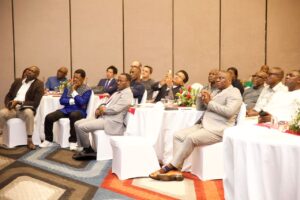Flagbearer hopeful for the New Patriotic Party in the upcoming 2024 general elections, Alan Kyerematen, has unveilled his Great Transformational Plan (GTP) as a new direction toward accelerated growth and economic development when he elected president.
Speaking during a meeting with key private sector institutions on June 13 in Accra, Mr. Kyerematen said the Plan will position the country to break the cycle of dependency on IMF bailouts.
“Through deliberate government policy, the private sector can be positioned to turn the economy around in the preferred direction to avoid IMF bailouts,” he said.
The GTP aims to foster a more self-reliant and resilient economy, propelling Ghana from a state of stability and growth to one of transformation.
He stressed the need for a comprehensive plan to guide the nation beyond the transitional Post-COVID Economic Recovery Programme (P-CERP) currently underway with IMF support.
According to Kyerematen, the recent IMF bailout serves as a lesson that Ghana’s economy remains fragile, vulnerable and prone to external and domestic shocks. He attributed this vulnerability to the country’s heavy reliance on commodity exports with limited value addition.
Additionally, he highlighted that the projected 5.1 percent GDP growth for the Ghanaian economy in 2023 hinges on anticipated increases in global commodity prices.
The GTP’s success, as outlined by Mr. Kyerematen, will rely on robust macroeconomic fundamentals.
These include maintaining a stable currency, managing inflation rates, ensuring sustainable debt levels, optimising revenue generation, exercising prudent expenditure control to achieve fiscal balance, fostering low competitive interest rates, and building strong external reserves supported by ample liquidity to fortify the financial sector.

The Plan also elaborated on how to leverage the agriculture, manufacturing and SMEs sectors and FDIs to propel growth.
The GTP also proposes a new policy direction in Ghana’s history of infrastructural development – toward private sector participation to ease the burden on central government financing for critical infrastructure.
Strategic partnership with private sector
The meeting was themed ‘Building a Strategic Partnership between Government and the Private Sector for Progress and Prosperity through the Great Transformational Plan (GTP)’, and discussed how to move the Ghanaian economy beyond growth to transformation in partnership with the private sector.
The GTP, according to the former Minister for Trade and Industry, is a ready-made plan to augment the IMF plan that is in place till 2028.
Mr. Kyerematen highlighted some components of the GTP and proffered new insights to tackle inflation, achieve a stable currency and reduce interest rates. He also highlighted the proposed New Agricultural Revolution (NAR) as a major way of influencing the value chain for food and food products.
According to him, the core of transformation is private sector participation. Small and Medium Scale (SME) enterprises will be actively supported in terms of progressive schemes that deepen access to finance, promote export diversification and value addition as well as import substitution programmes.
Partner Private Sector to Fund Infrastructure
Mr. Kyerematen hinted at government partnering the private sector to fund infrastructure in the country.
This becomes a new policy direction in Ghana’s history of infrastructural development.
The policy will ease the burden on central government in the area of infrastructure financing.
In his submission, he also called for more support to local companies.
In attendance were Business Owners, Chief Executive Officers and Managing Directors of the Private Sector in the country.
Private sector captains who attended the business meeting with Alan Kyerematen included the respective presidents of the Private Enterprise Federation, Nana Osei Bonsu; the Association of Ghana Industry (AGI), Dr. Ayim Darke; the Ghana National Chamber of Commerce and Industry, Mr. Clement Amoako; the Association of Small Scale Industries, Alhaji Mumin Saeed; and the Vice President of GUTA, Mr. Clement Boateng; Ms. Nura Salifu, Association of Garment and Apparel Manufacturers of Ghana; and Mr. Jeff Oppong Preprah, Automobile Assemblies Association of Ghana.










